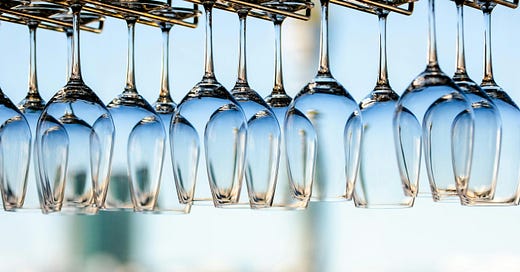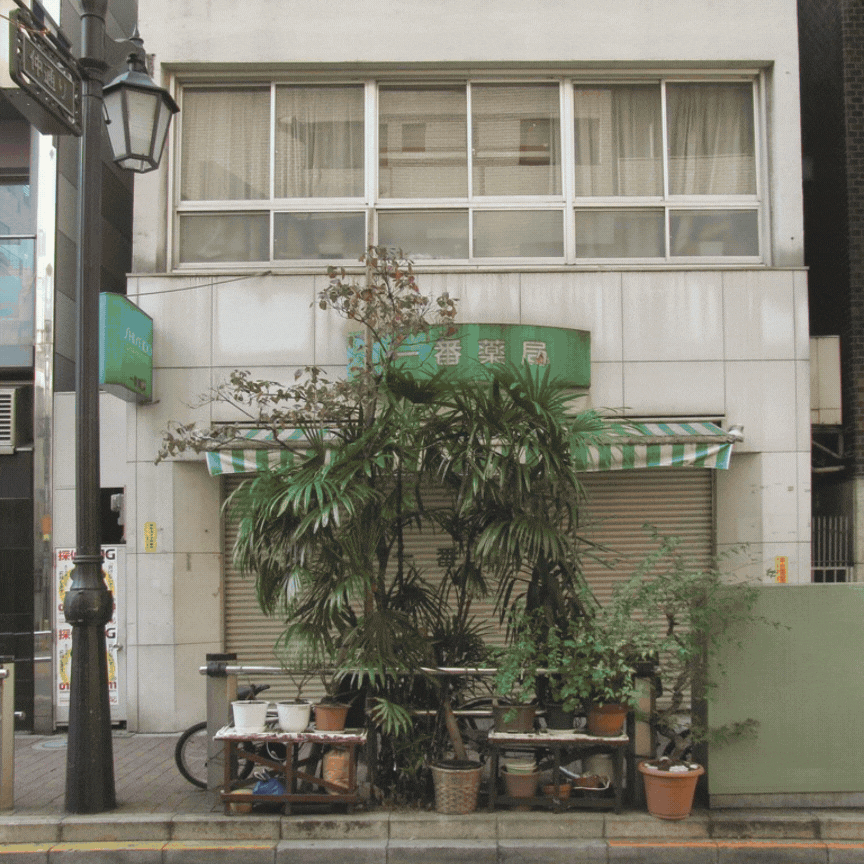#059 — The Sobriety Renaissance
How sobriety became cool and why it matters for our collective well-being.
Welcome back to another edition of Slow Letter!
In this issue we’re diving into a fascinating cultural shift that’s reshaping how we think about celebration, connection, and well-being. The sobriety renaissance, as we call it, isn’t just another wellness trend — it’s a fundamental transformation in how younger generations approach life’s pleasures and social connections. And for a good reason.
So whether you’re sober curious, mindful drinking, or simply interested in cultural transitions, this issue offers insights into one of the most significant lifestyle shifts of our time.
As always, we’ve also curated an inspiring collection of discoveries for you — from lunar music experiments to technological nostalgia, travel inspiration, and more. So grab your favorite (perhaps non-alcoholic?) beverage, and join us.
Enjoy! 💙
DISCOVER NEW STUFF
Your dose of curiosity
✻ An intriguing experiment shows how disconnecting from streaming services and returning to an iPod for 30 days can transform your relationship with music and technology. This fascinating YouTube series explores the impact of algorithms on art consumption and finding balance in our digital age, with some good tips for those who want to get free from the algorithms.
✻ As Los Angeles grapples with unprecedented firestorms, a powerful essay emerges questioning what happens when climate predictions become reality. Through poetic reflection and stark analysis, it paints a vivid picture of a city at the crossroads of climate crisis.
✻ Journey back in time with the newly unveiled Nokia Design Archive, a treasure trove of the company’s most innovative and sometimes wonderfully bizarre concepts. From a stretchable wrist phone to a touchscreen credit card that never saw daylight – it’s a fascinating glimpse into paths not taken in mobile technology.
✻ Planning your 2025 adventures? The New York Times’ annual “52 Places to Go” list arrives at the perfect time. A source of inspiration for your next adventure, this year’s selection promises to inspire wanderlust in everyone.
✻ In an incredible feat of technological creativity, someone has managed to get DOOM and Tetris running and playable... inside PDF documents. Yes, you read that right – and it’s as wonderfully unnecessary as it sounds.
✻ Even if you’re not a musician, you’ll be captivated by this mini-documentary about turning the Moon into a musical instrument. Watch as artists and scientists collaborate to bounce soprano vocals and bass notes off our lunar neighbor, capturing these cosmic echoes to create a free audio plugin. It’s a beautiful blend of space science, music, and pure human curiosity that reminds us why we continue to look up at the night sky.
“Is it possible to reconcile this fracture—that science knows the truth but cannot enjoy it, and that taste enjoys beauty, without being able to explain it?”
– Giorgio Agamben, “Taste”
GET INSPIRED
Sober Curiosity: A Cultural Awakening
Picture a Friday night in any major city: the bars are still full, but something’s different. Look closely, and you’ll notice a subtle transformation. Groups of friends are sipping sophisticated mocktails, non-alcoholic beers, and elegantly crafted drinks designed to be savored. The scene feels familiar, yet the energy is fresher, lighter. This new atmosphere reflects a shift in how people connect, celebrate, and unwind — one that values presence and health as much as pleasure.
This shift away from alcohol is not just a health movement, but a reimagining of how society approaches pleasure and connection. It’s a renaissance, driven by cultural, social, and scientific factors, reshaping our understanding of alcohol’s role in our lives.
The Numbers That Changed Everything
The statistics are striking: Generation Z consumes approximately 20% less alcohol than Millennials, according to recent Gallup data. This isn’t just a minor fluctuation—it represents a seismic shift in how younger generations approach drinking and socializing. This reduced consumption aligns with broader societal trends emphasizing mindfulness, sustainability, and intentionality.
The non-alcoholic beverage industry, once relegated to bland alternatives, is projected to experience a remarkable 25% growth between 2022 and 2026, according to Forbes. This growth reflects the rising demand for high-quality, sophisticated alternatives that cater to a new generation of health-conscious consumers.
What drives this change? The answer lies at the intersection of health consciousness, cultural shifts, and a redefinition of what it means to have fun and connect with others. These shifts are redefining social norms, encouraging inclusivity, and creating opportunities for individuals to engage meaningfully without relying on alcohol.
The Science of Sobriety
Recent research from the World Health Organization challenges long-held beliefs about alcohol consumption. The findings are stark: there is no “safe” level of alcohol intake (!!!). Even minimal consumption increases the risk of cancer, heart disease, and other chronic conditions.
The benefits of reducing or eliminating alcohol are well-documented too:
Improved Mental Health: Studies show significant reductions in anxiety and depression symptoms. Abstaining from alcohol can lead to improved emotional resilience and a greater sense of stability.
Better Sleep Quality: Enhanced REM sleep and more restful nights have been consistently reported by those who reduce their alcohol intake.
Enhanced Cognitive Function: Clearer thinking, better memory, and improved focus are benefits associated with sustained abstinence.
Stronger Immune System: Abstaining from alcohol strengthens the body’s natural defenses against infections and chronic diseases.
Better Physical Health: Reduced inflammation, improved liver function, and easier weight management are notable outcomes.
The truth emerges with crystal clarity: there is no such thing as risk-free drinking. Even moderate consumption affects our brain chemistry, altering everything from our emotional regulation to our decision-making abilities. The morning-after effects we typically attribute to hangovers — the brain fog, the mood swings, the decreased productivity — are just the visible tip of a much deeper iceberg.
The balance is clear. The only question is: what do you value more?
Beyond Abstinence: The Rise of Mindful Drinking
The “sober curious” movement, a term coined by Ruby Warrington, isn’t about strict abstinence — it’s about questioning our relationship with alcohol and making more conscious choices. This curiosity has sparked initiatives like Dry January and Sober October, which have grown from small experiments to global phenomena.
Research from the University of Sussex and Alcohol Change UK’s 2018 evaluation provides compelling insights into the impact of this month-long challenge. The comprehensive study revealed that participants reported multiple benefits from taking part. Around 70% of participants experienced improved general health, with 71% reporting better sleep quality and 67% noting increased energy levels. Additionally, 88% of participants saved money during the challenge.
What’s particularly notable is the lasting impact: the six-month follow-up study found significant improvements in drink-refusal self-efficacy (DRSE) — that crucial sense of being able to refuse alcohol in various situations. The study showed these improvements occurred regardless of whether participants completed the full month without drinking. Perhaps most significantly, most participants (79%) intended to drink less after Dry January than they did before taking part.
The research also found that successful completion of Dry January wasn’t significantly affected by socioeconomic factors, though those with lower baseline alcohol consumption were more likely to complete the challenge successfully. Importantly, even those who didn’t manage to stay completely dry during January still experienced benefits, with 73% of these participants reporting drinking less than they usually would on the occasions they did drink.
These findings show that participating in Dry January can lead to sustainable changes in both attitudes toward alcohol and drinking behaviors, with benefits extending well beyond the month itself. Maybe it’s worth giving a try, no matter the month?
The Economics of Sobriety
The OECD reports that alcohol-related healthcare spending accounts for 2.4% of total health expenditure in member countries. This figure underscores the significant burden alcohol places on public health systems globally. Breaking it down further, the associated costs include direct medical expenses, emergency services, and long-term treatments for alcohol-related conditions. Reducing alcohol consumption could substantially alleviate these financial pressures, freeing up resources for other critical healthcare needs.
The shift toward reduced alcohol consumption could have significant positive economic impacts:
Reduced healthcare costs, alleviating pressure on public health systems,
Increased workplace productivity, as healthier lifestyles lead to fewer sick days and higher performance levels,
Lower social service expenses related to alcohol misuse,
Growth in the alternative beverage market, driving economic opportunities and innovation.
These changes suggest that the sober movement is not only beneficial on a personal level but also holds the potential to reshape economies. Demographics play a crucial role in this shift. The percentage of young adults from diverse racial and ethnic backgrounds has nearly doubled over the past two decades, bringing different cultural perspectives on alcohol consumption. This diversification, combined with growing health consciousness across all demographics, is reshaping the beverage industry landscape.
Looking Forward: The Future of Sober Connection
As we move deeper into 2025 and beyond, the sobriety renaissance shows no signs of slowing. If anything, it’s gaining momentum as more people discover the benefits of mindful drinking or complete sobriety, which we invite you to try yourself. This isn’t just about avoiding alcohol – it’s about choosing presence, authenticity, and genuine connection.
The future already looks bright, but hopefully it brings:
More sophisticated non-alcoholic options,
Expansion of alcohol-free social venues beyond major urban centers,
Integration of mindful drinking practices in mainstream culture,
Continued innovation in functional beverages,
Growing acceptance of sobriety as a lifestyle choice,
Enhanced focus on mental health and wellness in social settings.
A Personal Choice, A Cultural Shift
The beauty of this renaissance lies in its inclusivity. Whether someone chooses complete sobriety, mindful drinking, or occasional indulgence, the movement creates space for more conscious choices about how we socialize, celebrate, and find joy. There’s something for everyone here.
As we continue to witness this cultural transformation, one thing becomes clear: the ability to connect, celebrate, and find joy isn’t found in a bottle — it’s within ourselves and the authentic moments we create with others.
The sobriety renaissance isn’t just a trend — it’s a fundamental shift in how we think about alcohol’s role in our lives, social connections, and personal well-being. As more people discover the benefits of mindful drinking or sobriety, this movement continues to grow, creating new possibilities for how we experience life’s moments, both big and small.
As society evolves, this movement stands as a testament to our capacity for change and the power of choosing what truly serves our well-being. So, as you consider your own journey, remember: the joy, clarity, and connection you seek may already be within reach — waiting for you to claim it.
Stay sober!
MISSED THE PREVIOUS ISSUE? STILL EAGER FOR MORE?
WITHOUT YOU, THERE’S NO US
Let’s stay in touch
If you enjoy content that enriches your mind and brightens your day, please follow us on your favorite social media platforms. We’re committed to sharing even more valuable and inspiring material, carefully curated especially for curious minds like yours on:
☀️ Threads
☀️ Bluesky
☀️ X
And if you enjoyed this issue, why not share it on social media or with your friends? Sharing is caring!






